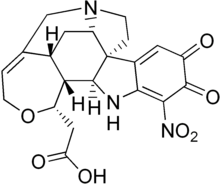From Wikipedia, the free encyclopedia
Cacotheline[1]

|
| Names
|
| IUPAC name
4-Nitro-2,3-dioxo-2,3-dihydro-9,10-secostrychnidin-10-oic acid
|
Systematic IUPAC name
[(4bS,7aS,8aR,13S,13aR,13bS)-1-Nitro-2,3-dioxo-2,3,5,6,7a,8,8a,11,13,13a,13b,14-dodecahydro-7,9-methanooxepino[3,4-a]pyrrolo[2,3-d]carbazol-13-yl]acetic acid |
| Other names
2,3-Dihydro-4-nitro-2,3-dioxo-9,10-secostrychnidin-10-oic acid
|
| Identifiers
|
|
|
|
|
|
|
| ChemSpider
|
|
| ECHA InfoCard
|
100.008.378
|
|
|
|
| UNII
|
|
|
|
|
InChI=1/C21H21N3O7/c25-12-6-11-17(18(19(12)28)24(29)30)22-20-16-10-5-14-21(11,20)2-3-23(14)8-9(10)1-4-31-13(16)7-15(26)27/h1,6,10,13-14,16,20,22H,2-5,7-8H2,(H,26,27)/t10-,13-,14-,16-,20-,21+/m0/s1 Key: IVEMPCACOMNRGI-OFDJEBHLBG
|
[O-][N+](=O)C=1C(=O)C(=O)/C=C3\C=1N[C@H]4[C@H]2[C@@H]6/C(=C\CO[C@H]2CC(=O)O)CN5CC[C@]34[C@@H]5C6
|
| Properties
|
|
|
C21H21N3O7
|
| Molar mass
|
427.41 g/mol
|
| Appearance
|
Yellow crystals
|
| Density
|
1.62 g/cm3
|
| Hazards
|
| Flash point
|
374.6 °C (706.3 °F; 647.8 K)
|
Except where otherwise noted, data are given for materials in their standard state(at 25 °C [77 °F], 100 kPa). |
Chemical compound
Cacothelineis an organiccompoundwith thechemical formulaC21H21N3O7.It is anitroderivative ofbrucineobtained by reaction of brucine withnitric acid.[1]It is used as an indicator in thetitrimetricanalysis oftinions (Sn2+).
|
|---|
Receptor
(ligands) | | GlyRTooltip Glycine receptor |
- Positive modulators:Alcohols(e.g.,brometone,chlorobutanol (chloretone),ethanol (alcohol),tert-butanol (2M2P),tribromoethanol,trichloroethanol,trifluoroethanol)
- Alkylbenzene sulfonate
- Anandamide
- Barbiturates(e.g.,pentobarbital,sodium thiopental)
- Chlormethiazole
- D12-116
- Dihydropyridines(e.g.,nicardipine)
- Etomidate
- Ginsengconstituents (e.g.,ginsenosides(e.g.,ginsenoside-Rf))
- Glutamic acid (glutamate)
- Ivermectin
- Ketamine
- Neuroactive steroids(e.g.,alfaxolone,pregnenolone (eltanolone),pregnenolone acetate,minaxolone,ORG-20599)
- Nitrous oxide
- Penicillin G
- Propofol
- Tamoxifen
- Tetrahydrocannabinol
- Triclofos
- Tropeines(e.g.,atropine,bemesetron,cocaine,LY-278584,tropisetron,zatosetron)
- Volatiles/gases(e.g.,chloral hydrate,chloroform,desflurane,diethyl ether (ether),enflurane,halothane,isoflurane,methoxyflurane,sevoflurane,toluene,trichloroethane (methyl chloroform),trichloroethylene)
- Xenon
- Zinc
- Antagonists:2-Aminostrychnine
- 2-Nitrostrychnine
- 4-Phenyl-4-formyl-N-methylpiperidine
- αEMBTL
- Bicuculline
- Brucine
- Cacotheline
- Caffeine
- Colchicine
- Colubrine
- Cyanotriphenylborate
- Dendrobine
- Diaboline
- Endocannabinoids(e.g.,2-AG,anandamide (AEA))
- Gaboxadol (THIP)
- Gelsemine
- iso-THAZ
- Isobutyric acid
- Isonipecotic acid
- Isostrychnine
- Laudanosine
- N-Methylbicuculline
- N-Methylstrychnine
- N,N-Dimethylmuscimol
- Nipecotic acid
- Pitrazepin
- Pseudostrychnine
- Quinolines(e.g.,4-hydroxyquinoline,4-hydroxyquinoline-3-carboxylic acid,5,7-CIQA,7-CIQ,7-TFQ,7-TFQA)
- RU-5135
- Sinomenine
- Strychnine
- Thiocolchicoside
- Tutin
- Negative modulators:Amiloride
- Benzodiazepines(e.g.,bromazepam,clonazepam,diazepam,flunitrazepam,flurazepam)
- Corymine
- Cyanotriphenylborate
- Daidzein
- Dihydropyridines(e.g.,nicardipine,nifedipine,nitrendipine)
- Furosemide
- Genistein
- Ginkgoconstituents (e.g.,bilobalide,ginkgolides(e.g.,ginkgolide A,ginkgolide B,ginkgolide C,ginkgolide J,ginkgolide M))
- Imipramine
- NBQX
- Neuroactive steroids(e.g.,3α-androsterone sulfate,3β-androsterone sulfate,deoxycorticosterone,DHEA sulfate,pregnenolone sulfate,progesterone)
- Opioids(e.g.,codeine,dextromethorphan,dextrorphan,levomethadone,levorphanol,morphine,oripavine,pethidine,thebaine)
- Picrotoxin(i.e.,picrotinandpicrotoxinin)
- PMBA
- Riluzole
- Tropeines(e.g.,bemesetron,LY-278584,tropisetron,zatosetron)
- Verapamil
- Zinc
|
|---|
| NMDARTooltip N-Methyl-D-aspartate receptor | |
|---|
|
|---|
Transporter
(blockers) | | GlyT1Tooltip Glycine transporter 1 | |
|---|
| GlyT2Tooltip Glycine transporter 2 | |
|---|
|
|---|
|

